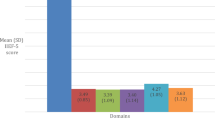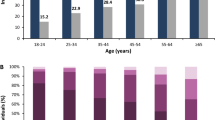Abstract
The aim of this study was to analyze the impact of patient age and education level on the comprehension of the Turkish version of Index of Erectile Function (IIEF), and to determine the patient characteristics that make this questionnaire less reliable. In this study, 238 male patients presenting to our clinic were enrolled. The patients were asked to complete the Turkish version of the IIEF questionnaire upon arrival by themselves and then once again during their second visit with the assistance of a physician. ‘Accurate’ comprehension of the IIEF was considered to be the consistency between the ‘self-administered’ and ‘physician-assisted’ IIEF scores. The impact of patient age and education level on the ‘accurate’ comprehension of the IIEF was analyzed. There was a significant difference between the ‘self-administered’ and ‘physician-assisted’ IIEF scores in patients ⩾60 years of age (P=0.045) and primary school graduates (P=0.015). Age ⩾60 years and being primary school graduate are factors lowering the comprehension of the Turkish version of the IIEF by the patients. Older patients and patients with lower education could benefit from the assistance of a physician while completing this questionnaire.
This is a preview of subscription content, access via your institution
Access options
Subscribe to this journal
Receive 8 print issues and online access
$259.00 per year
only $32.38 per issue
Buy this article
- Purchase on Springer Link
- Instant access to full article PDF
Prices may be subject to local taxes which are calculated during checkout
Similar content being viewed by others
References
Arrington R, Cofrancesco J, Wu AW . Questionnaires to measure sexual quality of life. Qual Life Res 2004; 13: 1643–1658.
Daker-White G . Reliable and valid self-report outcome measures in sexual (dys)function: a systematic review. Arch Sex Behav 2002; 31: 197–209.
Rosen RC, Cappelleri JC, Gendrano III N . The International Index of Erectile Function (IIEF): a state-of-the-science review. Int J Impot Res 2002; 14: 226–244.
Rosen RC, Riley A, Wagner G, Osterloh IH, Kirkpatrick J, Mishra A . The international index of erectile function (IIEF): a multidimensional scale for assessment of erectile dysfunction. Urology 1997; 49: 822–830.
Cappelleri JC, Rosen RC, Smith MD, Mishra A, Osterloh IH . Diagnostic evaluation of the erectile function domain of the International Index of Erectile Function. Urology 1999; 54: 346–351.
Akkus E, Kadioglu A, Esen A, Doran S, Ergen A, Anafarta K et al. Prevalence and correlates of erectile dysfunction in Turkey: a population-based study. Eur Urol 2002; 41: 298–304.
Tokatli Z, Akand M, Yaman O, Gulpinar O, Anafarta K . Comparison of international index of erectile function with nocturnal penile tumescence and rigidity testing in evaluation of erectile dysfunction. Int J Impot Res 2006; 18: 186–189.
Rosen RC, Althof SE, Giuliano F . Research instruments for the diagnosis and treatment of patients with erectile dysfunction. Urology 2006; 68 (Suppl): 6–16.
Johnson TV, Goodman M, Master VA . The efficacy of written screening tools in an inner city hospital: literacy based limitations on patient access to appropriate care. J Urol 2007; 178: 623–629.
Serefoglu EC, Atmaca AF, Dogan B, Altinova S, Akbulut Z, Balbay MD . Problems in understanding the Turkish translation of the international index of erectile function. J Androl 2008; 29: 369–373.
Wiltink J, Hauck EW, Phädayanon M, Weidner W, Beutel ME . Validation of the German version of the International Index of Erectile Function (IIEF) in patients with erectile dysfunction, Peyronie's disease and controls. Int J Impot Res 2003; 15: 192–197.
Glina S, Mello L, Martins F . International Index of Erectile Function (IIEF): is it an universal tool? Program and Abstracts of the 96th Annual Meeting of the American Urological Assocation; 2–7 June; Anaheim, CA, 2001.
IIEF Validation Group of Turkish Society of Andrology. International Index of Erectile Function (IIEF) Turkish version, 4th National Sexual Dysfunction Congress Abstract Book 2002, p 43.
MacDiarmid SA, Goodson TC, Holmes TM, Martin PR, Doyle RB . An assessment of the comprehension of the American Urological Association Symptom Index. J Urol 1998; 159: 873–874.
Author information
Authors and Affiliations
Corresponding author
Ethics declarations
Competing interests
The authors declare no conflict of interest.
Rights and permissions
About this article
Cite this article
Öztürk, M., Koca, O., Keleş, M. et al. Question for a questionnaire: the International Index of Erectile Function. Int J Impot Res 23, 24–26 (2011). https://doi.org/10.1038/ijir.2010.31
Received:
Revised:
Accepted:
Published:
Issue Date:
DOI: https://doi.org/10.1038/ijir.2010.31
Keywords
This article is cited by
-
The relationship between erectile dysfunction and the Atherogenic Index of Plasma
International Journal of Impotence Research (2020)



